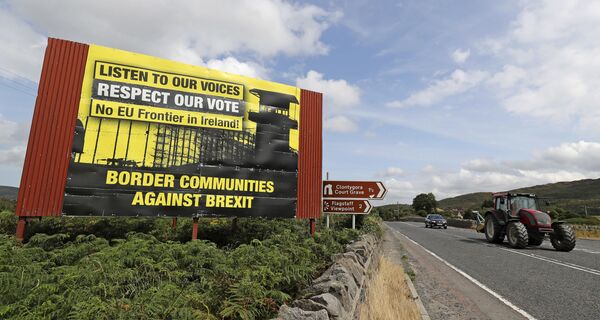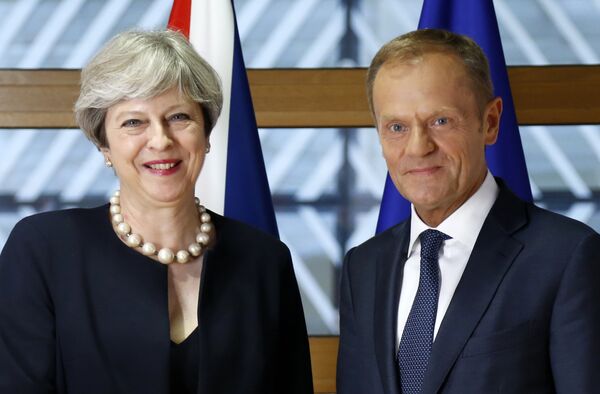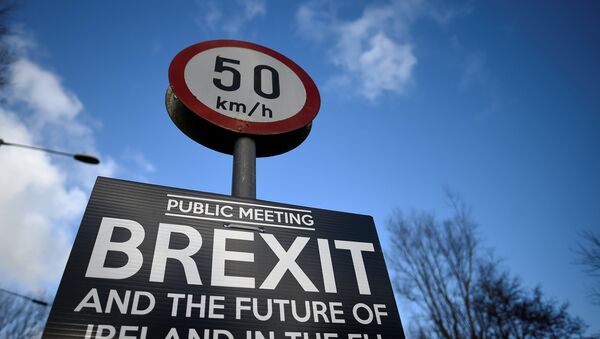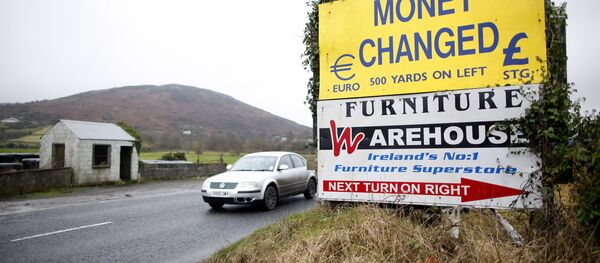A softening in Dublin's position on the Irish border matter is indicative of its readiness to show some flexibility, which in turn could propel Brexit talks towards resolution.
Ireland's Foreign Minister said on Thursday his government doesn't "want to see any border on the Irish Sea" but added that Ireland is ready to "show some flexibility" when it comes to finding an acceptable solution to the Irish border question. At the same time, the Northern Ireland unionists have been clear that any regulatory divergence between Belfast and the rest of the UK is a "red line" for Stormont.
Sputnik discussed latest developments around the Irish border matter in the Brexit negotiations with Professor of Economic History at Queen's University Belfast, Dr. Liam Kennedy.
Sputnik: Theresa May said on Wednesday that no simple free trade agreement could achieve a seamless border in Northern Ireland, even one that makes use of the very latest technology. What's your take on that?
Dr. Liam Kennedy: It is a kind of poker game. I'm not surprised Michel Barnier rejected Mrs. Mays' Chequers suggestion, and that the British are downplaying the Irish border issue. It is all part of the negotiations where neither side wants to reveal their hands too clearly at this stage.
Sputnik: Ireland does not want a border to emerge in the Irish Sea that would divide Northern Ireland from the rest of the United Kingdom, Irish Foreign Minister Simon Coveney said on Wednesday. What does this statement mean in the wider context?
Dr. Liam Kennedy: That is a movement by Dublin, by the Irish government. Some politicians have been saying it is the obvious thing to do and that Northern Ireland should have a special status as a region within the European Union. That's an absolute anathema to Ulster unionists and to many British Tories. Coveney's comments would seem to fit with something of a softening of the Irish government's positions. It is some recognition of the difficulty the British government is facing in trying to resolve that issue.

Sputnik: Will there be a compromise?
Dr. Liam Kennedy: On the border issue, my guess is, there will be compromise. I don't think the Irish government would want it to be the issue on which the Brexit negotiations fail. From a Dublin's viewpoint if there is a "no deal" Brexit, they would prefer the issue to break the negotiations to be something else, like tariffs security issues.
We are entering a very delicate stage — the final stage — of negotiations. At the moment, we are at the position where there are so many possibilities: a "no deal" Brexit or a deal of some kind. Of course, if there is a deal, there is a chance the UK parliamentarians will vote it down.
Sputnik: DUP leader Arlene Foster said that a hard border is a "red line" for the DUP but she also said that the Belfast Agreement could be altered to accommodate Brexit agreement. What does it mean for the peace process?
Dr. Liam Kennedy: The DUP leader is correct. We've had subsequent agreement, notably the St. Andrew's agreement, which made some further changes under the Good Friday Agreement but not major ones. The Good Friday Agreement allowed for a review of its operations.
I don't think the DUP are particularly interested at this stage in some renegotiation of the Good Friday Agreement, which they know quite well, is not a realistic option. London won't agree to it, Dublin won't agree to it — and they are the two key players. At the moment it's a bit of a red herring. Technically, Arlene Foster was right — it is possible to make changes to the Good Friday Agreement but it is incredibly unlikely.

Sputnik: No-one seems to want a hard border and no-one seems to want a "no deal," but no viable solution has been offered so far.
Dr. Liam Kennedy: British Tories would say that there are technological solutions to the issue of cross-border trade and that would go to some distance in softening the customs barriers between north and south.
On the other hand, nationalists in Northern Ireland say it is unacceptable and Dublin is saying the same at present as well. It is possible that Dublin will soften its stance and move to the position of minor frictions between north and south, underpinned by technical advancements that don't require physical stops.
At the end of the day, one side is going to give in on this. You could argue if there is an almost two-year transition period, disruption in the north-south will be tiny. In the meantime, all transgressions will be made to ensure that border crossing is as simple and as frictionless as possible in the medium to longer term. There is a fundamental contradiction at the moment though.
Sputnik: Is time running out for the UK government to come up with a workable solution to this stalemate?
Dr. Liam Kennedy: On an optimistic note, the history of European Union negotiations, particularly on common agricultural policy within the EU, is a history of late night sessions and eventual compromise at the very last moment.

On balance, some kind of negotiated exit, more or less acceptable to both sides, may emerge. But that's really sticking my neck out in terms of predictions.
The views and opinions expressed by the speaker do not necessarily reflect those of Sputnik.


